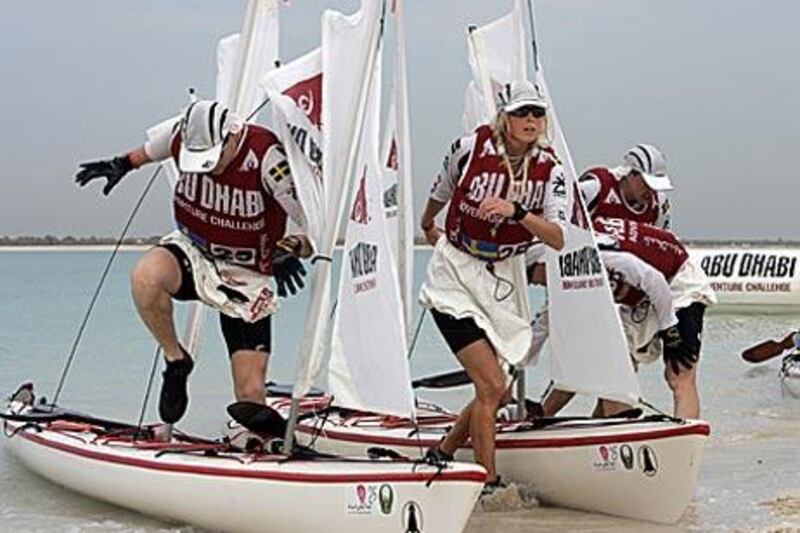Day One of the Abu Dhabi Adventure Challenge did not go well for Kristin Larsson. She passed out an hour into the first event, and struggled through the rest of the day trying to recover. But by dawn yesterday, she and her teammates were back in the running. If success in the Abu Dhabi Adventure Challenge is achieved through persistence over pain, Kristin Larsson may become the poster girl for the 2009 race.
The Swedish athlete appeared to be down and out on Friday, lying barely conscious on a gurney. She had passed out an hour into the first event of the six-day race through Abu Dhabi's cityscape, coastline, dunes and mountains. Less than 24 hours later, she and three teammates were back in the top half of the field after overcoming a string of adversities that would have felled most people. Larsson said her team had gone out too hard and fast in the initial stage of the race, a cycling, running, swimming and kayaking event through downtown Abu Dhabi.
"I can't remember the last 15 minutes of the run until I woke up in a car," she said. Her teammates rushed her to the race doctor, and months of training and tens of thousands of dirhams seemed to have come to nothing as she lay sobbing in the arms of her boyfriend. Another member of Team Sweco Karlstad Adventure, Magnus Albinsson, was sporting an impressive bruise on his face and a cut shin from hitting a sign on the running section.
But anyone who thought the team was finished does not know Larsson like Albinsson does. "When she doesn't want to continue, it means she's 10 feet down," he said meaning, dead and buried. "She's very stubborn." After conceding a time penalty for missing the second half of the first event and after getting clearance from the race doctor, Larsson opted to continue in the second stage at midday, a 62km sea kayak past Saadiyat Island.
It turned out she had not fully recovered from her collapse. Every time she tried to eat or drink anything, she would throw it back up. After paddling through heavy swells out past Lulu Island and Zayed Port, she was able to take advantage of being in a two-person boat to make up for her depleted energy levels from not being able to eat. When a checkpoint at the far end of the beach on Saadiyat Island forced them to land briefly, breakers up to a metre high capsized their kayak and they had to drag it to the shore and empty it. By the time she arrived at the overnight bivouac on a sandbar past Saadiyat Island, she looked dead on her feet.
"I hope it will get better if I get some sleep and something to eat," she said. "I've still been throwing up everything." At dawn yesterday, when the team lined up for the next kayaking leg, they chose the longer option an 80km circuit through the tidal channels instead of the shorter 50km leg. The previous day's problems were quickly left behind, and midway around the course the group was in fifth place among the teams taking the harder route. They were less than 15 minutes behind the frontrunners, Qasr al Sarab, which includes Richard and Elina Ussher, who won the first two adventure challenges.
Larsson's team, captained by Tomas Nordlander, faded towards the end of the kayaking, but still finished in four hours and three minutes, faster than some of the teams doing the 50km alternate route. They were about half an hour behind Qasr al Sarab. The Sweco team was not the only one suffering. Many of the kayakers failed to reach the island bivouac before dark and spent an hour or more attempting to navigate against a strong ebb tide and a maze of sandbanks.
One team overshot the island and had to paddle back, while another team had to be rescued by the Abu Dhabi Coast Guard. They were left without their boats on the island, and had to spend a chilly night with just the clothes and emergency equipment they had with them. By comparison, Qasr al Sarab made it look easy. Their lead has increased over every stage of the race and they now have a 26-minute lead over the next-placed team, their fellow New Zealanders Team Adco. Both front-running teams aim to build a buffer ahead of what they see as their toughest competition, the French team Vibram Sport 2000, which they believe will be strong in the 120km desert section that begins today. The French team is 40 minutes behind Qasr al Sarab in third place.
jhenzell@thenational.ae






